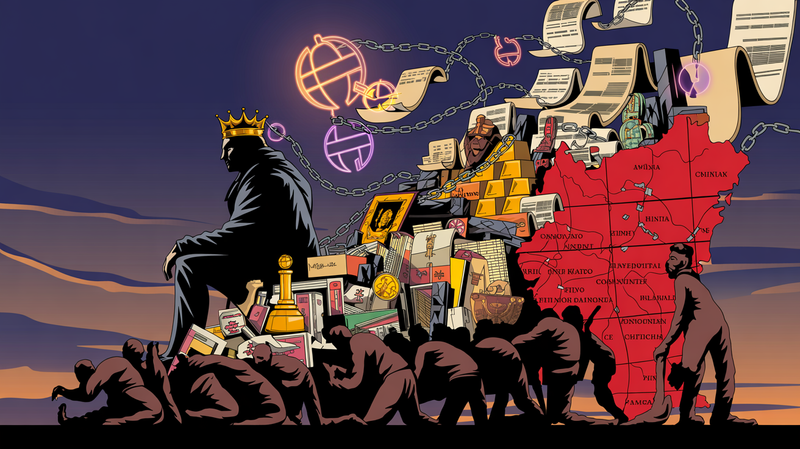Clandestine Chess: The CIA's Delicate Balancing Act in the Ukraine Conflict
One of the least known aspects of the Ukraine war is how little the CIA actually knows. In a startling revelation, the Agency finds itself uncertain about the thoughts and intentions of both Ukraine's Volodymyr Zelensky and Russia's Vladimir Putin. Amidst Putin's most significant

One of the least known aspects of the Ukraine war is how little the CIA actually knows. In a startling revelation, the Agency finds itself uncertain about the thoughts and intentions of both Ukraine's Volodymyr Zelensky and Russia's Vladimir Putin. Amidst Putin's most significant challenge following a failed mutiny, the Agency is under pressure to understand how the two leaders will react. This analysis is crucial because President Joe Biden has resolved not to take any actions that could jeopardize Russia or its statehood, to prevent Putin from escalating the conflict and potentially plunging all of Europe into a new World War.
However, the U.S. stance is precarious due to a near-mutiny by Yevgeny Prigozhin, the leader of the Wagner Group, raising doubts about whether Moscow has exhausted all options. "Putin's back is really against the wall," a senior defense intelligence official informs Newsweek, cautioning that while the CIA comprehends the extent of Russia's quagmire in Ukraine, it remains largely in the dark about Putin's potential reaction.
Newsweek's thorough examination of the CIA's activities in Ukraine amidst increasing Congressional inquiries about the extent of U.S. aid raises concerns about Biden's promise of "no boots on the ground." Both the CIA and the White House declined to provide specific details or confirmations, though they requested that Newsweek not disclose the specific locations of CIA operations within Ukraine or Poland or other countries involved in clandestine CIA efforts.
Over a three-month investigation, Newsweek consulted with more than a dozen intelligence experts and officials. The consensus among these professionals was that the CIA has played an efficient, discreet role in dealing with Kyiv and Moscow. However, understanding the inner workings of the Russian and Ukrainian leadership has proved challenging.
The unique aspect of this war is the alignment between the United States and Ukraine, despite the two countries not being allies. While the U.S. is assisting Ukraine against Russia, it's not formally at war with Russia, meaning much of Washington's aid to Ukraine is shrouded in secrecy and carried out by the Agency. All activities, including operations within Ukraine, must adhere to the constraints set by Biden.
Maintaining this precarious equilibrium—the CIA's active involvement in the war without contravening Biden's central pledge—poses a daunting challenge. For the CIA, its significant role in the Ukrainian war has boosted morale following the strained relationship between the former President Donald Trump and his spy chiefs.
However, it's imperative for the CIA to distance itself from any actions implying a direct assault on Russia or any involvement in actual combat, which Kyiv has repeatedly carried out, like sabotaging the Nord Stream pipeline, the Kerch Strait bridge, and executing cross-border drone and special operations attacks.
CIA's central role in the conflict, particularly allegations of killing Russian generals on the battlefield or crucial strikes outside Ukraine, doesn't sit well with Kyiv. "If we want Kyiv to listen to us, we need to remind ourselves that the Ukrainians are winning the war, not us," says one retired senior military intelligence official.
Washington's displeasure with the Zelensky government concerning the Nord Stream attack last September, followed by subsequent strikes, including a recent drone attack on the Kremlin, raises questions about one of CIA's main responsibilities—knowing enough about the Ukrainians' plans to both influence them and adhere to their secret pact with Moscow.
Since the onset of his administration, Biden assigned CIA director William Burns as his global troubleshooter, capable of communicating with foreign leaders outside traditional channels and handling affairs that fall between overt and covert military and civilian operations. Burns, a former Ambassador to Russia, has been particularly influential concerning Ukraine.
As the war proceeds, Washington's focus has transitioned from public troop deployments in Europe to deter further Russian moves, to providing weapons to maintain Ukraine's fighting capacity. Zelensky's persuasive public lobbying has gradually convinced the United States to supply more potent and long-range weapons. Although these weapons could potentially threaten Russian territory, they also risk escalating the conflict.
However, the Zelensky administration has had to agree to certain unspoken boundaries. Secret diplomacy led mostly by the CIA has resulted in Kyiv promising not to use these weapons to attack Russia. Zelensky has openly declared that Ukraine will not attack Russia.
Nevertheless, the Agency's role, far from being diminished, is more significant than ever. It is grappling with a complex balancing act, caught between fulfilling its critical role in managing delicate NATO relations and averting further escalation of the war, all while avoiding the implications of a direct combat role. For the CIA, the stakes could not be higher. Their performance amid these challenges may very well shape the future course of the conflict in Ukraine, and potentially, the geopolitical landscape of Europe.
While the CIA has been successful in playing its discreet part in handling Kyiv and Moscow, it's struggling to predict the strategies of both the Russian and Ukrainian leadership. The conundrum facing the CIA is a vivid reminder of the complex realities of modern warfare and espionage, particularly in the delicate dance of geopolitics involving major world powers.
The Ukraine conflict has placed the CIA in a role it must navigate carefully: to act as a key player in a war without contradicting the administration's pledge of no American boots on the ground, all while managing complex intelligence operations and diplomatic channels. As the situation unfolds, the CIA's role and performance will continue to be watched closely by those inside and outside the intelligence community.
Karma's Repercussions: The Fallout of Covert Operations in the Ukraine Conflict
Early in the conflict, Kyiv entered into an informal agreement with Washington to respect the Biden administration's limitations on attacking Russia. This placed Ukraine at a military disadvantage as Russian forces were free to launch air and missile attacks from their own territory. In return, the U.S. promised to supply arms and intelligence which were supplied in increasing quantities and firepower as Zelensky continued to apply pressure.
This unofficial agreement held for a while, with occasional cross-border artillery attacks and some misfired weapons landing in Russia. In each case, Ukraine denied involvement.
The Nord Stream gas pipelines were attacked on September 26. Despite not being in Russia, they were majority-owned by Russian state gas firm Gazprom. Once again, Ukraine denied involvement despite the CIA's suspicions. Zelensky's top aide dismissed any speculation to the contrary as "amusing conspiracy theories."
The Kerch Strait bridge was attacked with a truck bomb on October 8. Ukraine had previously threatened to attack the 12-mile bridge that connects Russia and the Crimean Peninsula, a territory that Moscow annexed in 2014. Although it was unclear who was responsible for the attack, Putin blamed Ukrainian "special services". Putin warned that if the terrorist acts continued, Russia's response would be harsh. Russia did indeed follow through with multiple attacks on targets in Ukrainian cities.
In the aftermath of the Russian retaliatory strike, the White House reiterated its commitment to stand with the people of Ukraine. However, behind the scenes, the CIA was working to determine the origins of the attacks.
With the attack on the Crimea bridge, the CIA realized that Zelensky either did not have complete control over his own military or was choosing to remain ignorant of certain actions. This sentiment was further solidified when the Kerch bridge attack was followed by a long-range strike on the Engels Russian bomber base, almost 700 miles from Kyiv.
The CIA, according to a senior U.S. official, was unaware of these attacks beforehand. However, rumors began to circulate that the Agency was indirectly directing strikes on Russia through a third party. The Agency issued a strong and unusual on-the-record denial. "The allegation that the CIA is somehow supporting saboteur networks in Russia is categorically false," said CIA spokesperson Tammy Thorp.
This year in January, Burns returned to Kyiv to meet with Zelensky and his Ukrainian counterparts. They discussed the covert war and the need to maintain strategic stability. However, the talks had little impact, as Kyiv was becoming more willing to take risks due to tasting a potential victory, and Russian sabotage groups had also begun to emerge.
All of this led to a drone attack inside the Kremlin walls in Moscow on May 3. Russia's Security Council Secretary Nikolai Patrushev blamed the U.S. and Britain, stating that the terrorist attacks committed in Russia were designed to destabilize the socio-political situation and undermine Russia's constitutional foundations and sovereignty. Ukrainian officials indirectly admitted responsibility. "Karma is a cruel thing," responded Zelensky advisor Mykhailo Podolyak, adding fuel to the fire.
According to a senior Polish government official, convincing Kyiv to uphold its commitment to keep the war limited might prove impossible. The official, requesting anonymity, criticized the CIA for failing to understand the nature of the Ukrainian state and the reckless factions existing within it.
In response, a senior U.S. defense intelligence official emphasized the delicate balance the Agency must maintain in its multiple roles, saying: "I hesitate to say that the CIA has failed." But the official admitted that the sabotage attacks and cross-border fighting have complicated the situation. If Ukrainian sabotage continues, it "could have disastrous consequences."




